
Bradwell is an ancient village and modern district in Milton Keynes, Buckinghamshire, England. It has also given its name to a modern civil parish that is part of the Borough of Milton Keynes. The village was adjacent to Bradwell Abbey, a Benedictine priory, founded in 1155 and dissolved in about 1540, but the abbey and its immediate environs were always a separate ecclesiastical parish.

Polegate is a town and civil parish in the Wealden District of East Sussex, England, United Kingdom. It is located five miles (8 km) north of the seaside resort of Eastbourne and is part of the greater area of that town. Although once a railway settlement, its rail links were closed as part of the Beeching cuts. The 2011 census put the civil parish of Polegate at a population of 8,586, with 41.2% aged 65 and over.

Alfold is a village and civil parish in Surrey, England on the West Sussex border. Alfold is a dispersed or polyfocal village in the Green Belt, which is buffered from all other settlements. The Greensand Way runs north of the village along the Greensand Ridge and two named localities exist to the north and south of the historic village centre which features pubs, a set of stocks and a whipping post.

Woodspring Priory is a former Augustinian priory. It is near the scenic limestone promontory of Sand Point and Middle Hope, owned by the National Trust, beside the Severn Estuary about 3 miles (5 km) north-east of Weston-super-Mare, within the English unitary authority of North Somerset. Many of the buildings are Grade I listed, and the whole site is scheduled as an ancient monument.

Ewhurst is a rural village and civil parish in the borough of Waverley in Surrey, England. It is located 8.3 miles (13.4 km) south-east of Guildford, 2 miles (3.2 km) east of Cranleigh and 4.5 miles (7.2 km) south of Shere.
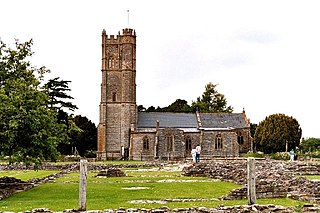
Muchelney Abbey is an English Heritage property in the village of Muchelney in the Somerset Levels, England. The site consists of ruined walls showing the layout of the abbey buildings constructed from the 7th to 16th centuries, and the remaining intact Abbot's House. It is next to the parish church in which some of the fabric of the abbey has been reused.
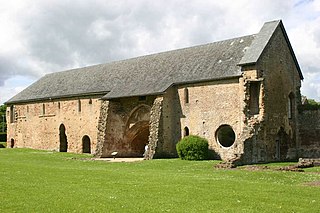
Cleeve Abbey is a medieval monastery located near the village of Washford, in Somerset, England. It is a Grade I listed building and has been scheduled as an ancient monument.
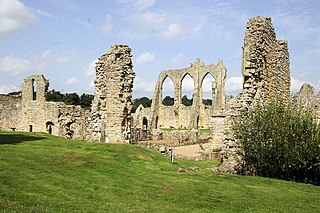
Bayham Old Abbey is an English Heritage property, located near Lamberhurst, Kent, England. Founded c. 1207 through a combination of the failing Premonstratensian monasteries of Otham and Brockley, Bayham functioned as an abbey until its dissolution in the 16th century. The ruins were partially modified in the late 18th century, to provide a better landscape feature during landscaping of the new Bayham Abbey mansion park, and were donated to the state in 1961.

Whalley Abbey is a former Cistercian abbey in Whalley, Lancashire, England. After the dissolution of the monasteries, the abbey was largely demolished and a country house was built on the site. In the 20th century the house was modified and it is now the Retreat and Conference House of the Diocese of Blackburn of the Church of England. The ruins of the abbey are recorded in the National Heritage List for England as a designated Grade I listed building, and are a Scheduled Ancient Monument.
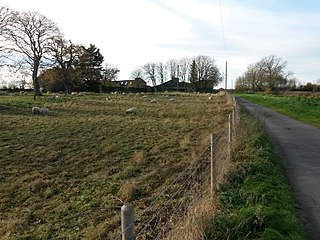
Broadholme Priory was a convent of canonesses of the Premonstratensian Order located near to the village of Broadholme. Historically in Nottinghamshire, since boundary changes in 1989, the priory and village has been in Lincolnshire.

Michelham Priory is the site of a former Augustine Priory in Upper Dicker, East Sussex, England, United Kingdom. The surviving buildings are owned and administered by the Sussex Archaeological Society and are Grade I and Grade II listed.

Newark Priory is a ruined priory on an island surrounded by the River Wey and its former leat near the boundary of the village of Ripley and Pyrford in Surrey, England.
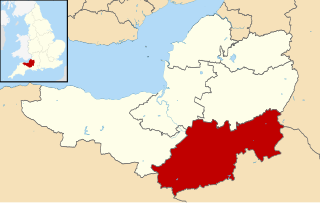
South Somerset is a local government district in the English county of Somerset. The South Somerset district occupies an area of 370 square miles (958 km2), stretching from its borders with Devon and Dorset to the edge of the Somerset Levels. The district has a population of about 158,000, and has Yeovil as its administrative centre.

Saighton Grange originated as a monastic grange. It was later converted into a country house and, as of 2013, the building is used as a school. It is located in Saighton, Cheshire, England. The only surviving part of the monastic grange is the gatehouse, which is recorded in the National Heritage List for England as a designated Grade I listed building, and is one of only two surviving monastic manorial buildings in Cheshire, the other being Ince Manor. The rest of the building is listed at Grade II, as is its chapel.

Robertsbridge Abbey was a Cistercian abbey in Robertsbridge, East Sussex, England. It was founded in 1176 by Alured and Alicia de St Martin.

Wilmington Priory was a Benedictine priory in the civil parish of Long Man, East Sussex, England. The surviving building is now owned by the Landmark Trust and let as holiday accommodation. It is both a Grade I listed building and a scheduled monument.

Bailiffscourt Chapel is a deconsecrated chapel in the grounds of Bailiffscourt Hotel, a luxury hotel near the hamlet of Atherington in West Sussex, England. Originally associated with the Norman Abbey of Séez, it was founded in the 11th century and rebuilt in its present simple Gothic form in the 13th century. It later fell out of use, but after Atherington's former church was destroyed by coastal erosion it was used again for public worship for a time—and as late as 1952 the building was again in use as a chapel of ease. Situated outside Bailiffscourt—a mock-medieval mansion built in 1935 by Lord Moyne on the site of an ancient manor house—on the only stretch of open seafront land for miles in each direction, the chapel is now used principally for wedding and civil ceremony blessings. English Heritage has listed it at Grade II* for its architectural and historical importance.

A total of 21 buildings and other structures in the English civil parish of Dodcott cum Wilkesley have been officially designated as listed buildings for their "special architectural and historic interest". Dodcott cum Wilkesley is in the Cheshire East division of the ceremonial county of Cheshire, situated on the Cheshire Plain at the border with Shropshire. The civil parish is predominantly rural, with many scattered minor settlements, the largest of which is the small village of Burleydam. One of the listed buildings is classified by English Heritage as being in grade I, meaning "of exceptional interest, sometimes considered to be internationally important" ; two are in grade II* and the remainder in grade II.


















